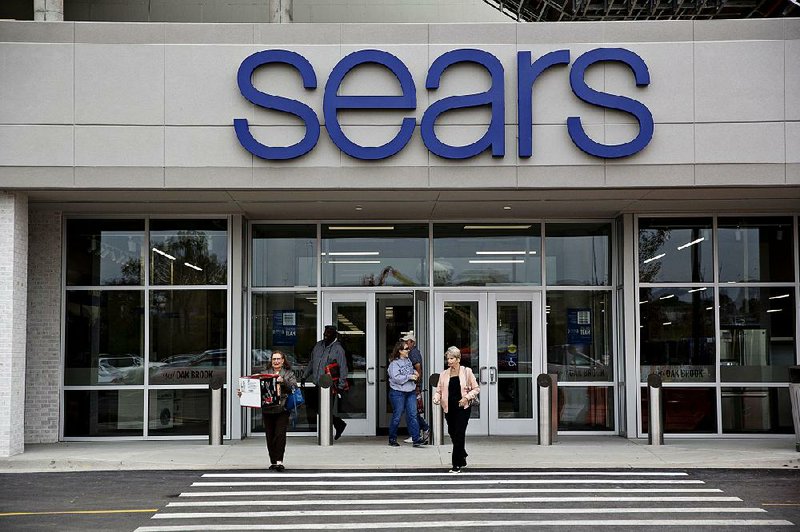Ever since Edward Lampert gained control of Sears Roebuck and Co. through his hedge fund's stake in Kmart back in 2005, he has held fast to a plan that he could make the combined giant into a vision of retailing's future, one that could compete with Walmart, and, more recently, Amazon.
But for much of that time, reality has fallen far short of his vision, with a series of setbacks culminating in Sears' bankruptcy filing in October.
This week, Sears Holdings Corp., as the combined company is now known, and its creditors will be in court to square off over whether Lampert, the retailer's chairman and former chief executive, should get yet another chance to rescue the iconic American retail chain and avoid a liquidation.
Lampert offered $5.2 billion to buy the retailer's assets and keep the company alive, and Sears declared that the winner of a bankruptcy auction last month. But Lampert's proposal, made through his hedge fund ESL Investments, still needs the endorsement of the U.S. Bankruptcy Court for the Southern District of New York, and it has run into opposition from creditors skeptical that Sears will be any more successful after exiting bankruptcy.
The case, affecting tens of thousands of workers and former employees, even has emerged as a potential 2020 campaign issue. Sen. Elizabeth Warren, D-Mass., who is expected to kick off her presidential campaign this week, bashed what she called Lampert's "inherent conflicts of interest" in a scathing letter to the company.
Hearings were scheduled to begin Monday and could extend to Wednesday.
Sears received five bids from parties interested in buying individual business units along with a couple of proposals from buyers who would liquidate the company's assets, but ESL Investments was the only bidder interested in acquiring the whole company and operating it, Sears said in a statement filed with the court Friday. ESL also has said it would bid on certain assets individually if the larger bid was rejected.
Initially, the company rejected ESL's bid. But Lampert sweetened the offer multiple times during negotiations in the bankruptcy auction, and the final bid was $5.2 billion for the company's remaining 425 stores, other assets and businesses. Sears decided it was the best option, saying it would recover more funds than if the business were to be shut down and sold, while keeping stores open and preserving 45,000 jobs, according to the Friday court filing.
A committee of Sears' unsecured creditors has said it believes ESL's plan would only delay the company's demise, according to court filings. The committee has pushed for a liquidation, arguing that shutting the company down and selling its assets could recover more of what Sears owes.
In its objection to the proposed sale, the committee also argued that the sale would benefit ESL at the creditors' expense and took issue with the decision to let ESL finance a portion of the deal by trading $1.3 billion in Sears debt it holds for ownership in the reorganized company.
The committee also has threatened legal action over financial dealings among Lampert, ESL and the retailer since Lampert combined Sears and Kmart in an $11 billion deal in 2005. That includes financing that ESL provided to Sears in recent years and transactions like the 2015 sale of more than 230 stores to Seritage Growth Properties, a real estate investment trust spun off from Sears that Lampert controls. Lampert is both a minority investor in Seritage and its chairman. Through his hedge fund, he is also Sears' largest shareholder.
ESL has denied the committee's allegations and said that its transactions with the retailer had the approval of the company's board and independent advisers, were done in good faith and show consistent support for the company.
The Pension Benefit Guaranty Corp., which guarantees individuals' pension plans if an insured plan shuts down without enough money to cover benefits, filed a lawsuit Friday seeking to take over Sears' pension plans. The federal agency has estimated that the plans, which cover 90,000 people, are underfunded by about $1.4 billion.
It is a member of the unsecured creditors' committee, but it added an independent objection to the sale to Lampert. Sears gave the pension guarantee fund an interest in intellectual property related to the Kenmore appliance and DieHard auto products plans to protect the guarantee fund if Sears' finances deteriorated. A sale to ESL would leave those brands under ESL's control and weaken those protections, according to the guarantee fund.
If the judge signs off on the sale, Lampert and ESL have said they believe the company can be profitable, but have shared few specifics of their plan to right the ship. In a court filing Friday, ESL said the company would be able to make more investments in new initiatives and get better terms with vendors after shedding debt and pension obligations. ESL also said it expected to continue pursuing a strategy Sears tested involving smaller stores focused on profitable categories, such as appliances.
Business on 02/05/2019
